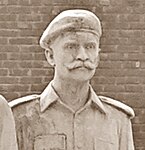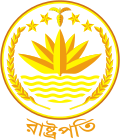Campaign
Prior to the elections six parties backing Ziaur Rahman – the Bangladesh Labour Party, the Bangladesh Muslim League, the Bangladesh Scheduled Caste Federation, Jatiyatabadi Ganatantrik Dal, the National Awami Party (Bhashani) and the United Peoples' Party – formed the Jatiyatabadi Front (Nationalist Front) to support his candidacy. [4]
M. A. G. Osmani was also supported by an alliance of six parties under the name Ganatantrik Oikkya Jote (United Democratic Alliance). The alliance consisted of the Awami League, the Communist Party, the Gano Azadi League, the Jatiya Janata Party, the National Awami Party (Muzaffar) and the People's League. [4]
A group of parties led by Ataur Rahman boycotted the elections, including the Democratic League, the Islamic Democratic League, Jatiya Dal, the Jatiya League and the Krishak Sramik Party. [4]
This page is based on this
Wikipedia article Text is available under the
CC BY-SA 4.0 license; additional terms may apply.
Images, videos and audio are available under their respective licenses.






